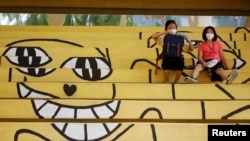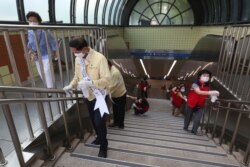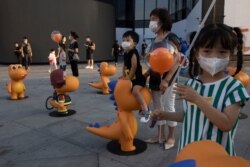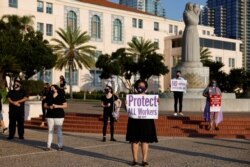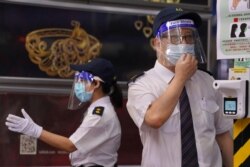South Korea is closing schools in the Seoul metropolitan area as it copes with a nearly two-week surge in coronavirus infections.
Education Minister Yoo Eun-hae said Tuesday most students will attend online classes at least until September 11, but that high school seniors would continue to attend in-person classes to prepare for national college entrance exams.
An outbreak in the southeastern region of South Korea delayed the start of the new school year for weeks before initiating phased reopenings in May.
South Korea’s Centers for Disease Control reported 280 new cases of COVID-19, increasing the 12-day total to 3,175 and the overall total to nearly 18,000.
Guidelines for children
As millions of children head back to school, the World Health Organization has issued its recommendation on whether they need to wear face masks.
The WHO and the United Nations Children's Fund (UNICEF) have broken their new guidelines into age groups, and they say children younger than 6 should not wear them.
"According to the limited available evidence, young children may have lower susceptibility to infection compared to adults, however available data suggests that this may vary by age among children," WHO and UNICEF said.
Children 6 to 11 should wear masks, but what the experts call a “risk-based control” should be considered. This includes social and cultural environments, the child’s ability to comply, and the impact mask wearing has on disabilities or underlying diseases.
Kids 12 and older need to be treated like adults when wearing masks.
But the WHO and UNICEF said no child should be denied access to an education if a mask is unavailable.
While children who are infected with COVID-19, the disease caused by the coronavirus, generally have mild or asymptomatic symptoms, they can still spread the virus to adults.
Situation in the US
In the U.S., which continues to lead the world in infections and COVID-19 deaths, the head of the Food and Drug Administration dismissed President Donald Trump’s accusation last weekend that the agency has “deep state” employees who are working to complicate efforts to test COVID-19 vaccines ahead of the November presidential election.
“I have not seen anything that I would consider to be a ‘deep state’ at the FDA,” Dr. Stephen Hahn told Reuters on Monday. Hahn said he was completely confident that FDA employees were committed to act in the interests of all citizens during the pandemic.
As of Tuesday, 5.7 million infections and over 177,000 deaths were reported in the U.S. by Johns Hopkins University, about one-quarter of the 23.6 infections worldwide and the more than 813,800 deaths throughout the world.
Drop in cases in Hong Kong
The Hong Kong government said Tuesday it will allow some movie theaters, beauty salons and outdoor sports facilities to reopen this week following a drop in coronavirus cases.
There was a surge on coronavirus infections in Hong Kong in July, prompting the government to impose its most stringent social distancing measures to date, resulting in a gradual decline in infections.
Meanwhile, scientists at the University of Hong Kong said they have found the first known case of someone who was infected twice with COVID-19.
The popular belief is that catching the coronavirus once makes people immune to a second case.
But the doctors say genetic tests on a 33-year-old male COVID-19 patient found that the strain he had after returning from a trip to Spain several weeks ago is different than the coronavirus strain he had in March.
“It shows that some people do not have lifelong immunity” to the virus if they've already had it, microbiologist Dr. Kelvin Kai-Wang To said. “We don’t know how many people can get reinfected. There are probably more out there.”




